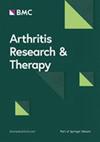Nocturnal baricitinib administration leads to rapid drug responses in rheumatoid arthritis: a multicenter non-randomized controlled study
IF 4.9
2区 医学
Q1 Medicine
引用次数: 0
Abstract
Inflammatory cytokine levels exhibit a circadian rhythm in sera, peaking from late night to early morning in patients with rheumatoid arthritis (RA). This cytokine kinetics is a recognized therapeutic target. This clinical study aimed to evaluate the effectiveness of night-time baricitinib administration based on cytokine secretion. In this 52-week multicenter non-randomized controlled study, 122 patients with RA were assigned to four groups: baricitinib 2 mg morning (BAR2MORN), 2 mg evening (BAR2EVE), 4 mg morning (BAR4MORN), or 4 mg evening (BAR4EVE). The primary endpoint was assessed using the 20% improvement in the American College of Rheumatology criteria (ACR20) at week 12. The secondary endpoints were ACR20/50/70 and changes in the clinical disease activity index (CDAI) through 52 weeks. The results were evaluated using the propensity score inverse probability of treatment weighted to reduce selection bias in patient background. BAR4EVE resulted in better primary endpoint improvement than BAR4MORN (78.2 vs. 43.3%; p < 0.001). No difference in improvement was observed in the primary endpoint between BAR2EVE and BAR2MORN (75.5 vs. 60.6%; p = 0.10). However, BAR2EVE demonstrated higher ACR20 at weeks 4, 24, and 52 and ACR50 at weeks 4 and 12 than BAR2MORN. BAR4EVE demonstrated higher ACR20/50 at weeks 4, 8, and 12 and ACR70 at weeks 8, 12, and 24 than BAR4MORN. CDAI changes were significantly reduced in BAR4EVE than in BAR4MORN at weeks 4 and 8. Chronotherapy targeting cytokine secretion resulted in rapid drug response, proposing a new potential application for JAK inhibitors. UMIN000040094, July 1, 2020.求助全文
约1分钟内获得全文
求助全文
来源期刊

Arthritis Research & Therapy
RHEUMATOLOGY-
CiteScore
8.60
自引率
2.00%
发文量
261
审稿时长
14 weeks
期刊介绍:
Established in 1999, Arthritis Research and Therapy is an international, open access, peer-reviewed journal, publishing original articles in the area of musculoskeletal research and therapy as well as, reviews, commentaries and reports. A major focus of the journal is on the immunologic processes leading to inflammation, damage and repair as they relate to autoimmune rheumatic and musculoskeletal conditions, and which inform the translation of this knowledge into advances in clinical care. Original basic, translational and clinical research is considered for publication along with results of early and late phase therapeutic trials, especially as they pertain to the underpinning science that informs clinical observations in interventional studies.
 求助内容:
求助内容: 应助结果提醒方式:
应助结果提醒方式:


